|
|
|
Sort Order |
|
|
|
Items / Page
|
|
|
|
|
|
|
| Srl | Item |
| 1 |
ID:
182761
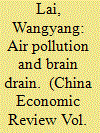

|
|
|
|
|
| Summary/Abstract |
This paper provides one of the few evidence about migration responses among talents to air pollution. Specifically, we investigate the impact of PM2.5 concentration on job location decisions of Chinese college graduates at the beginning of their professional careers. The results indicate that a 10-unit increase in PM2.5 concentration raises college graduates' probability to leave their current city by 10% point. We also find larger impacts on graduates from elite colleges and less polluted hometowns. Our empirical results are consistent with a simple model in which the location choice of college graduates depends on their wage payment and air pollution. Our findings supplement existent literature in documenting important ways in which air pollution may associate with the loss of highly-educated talents.
|
|
|
|
|
|
|
|
|
|
|
|
|
|
|
|
| 2 |
ID:
086997
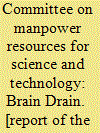

|
|
|
|
|
| Publication |
London, Her Majesty's Stationery Office, 1968.
|
| Description |
viii, 123p.
|
|
|
|
|
|
|
|
|
|
|
|
Copies: C:1/I:0,R:0,Q:0
Circulation
| Accession# | Call# | Current Location | Status | Policy | Location |
| 007051 | 331.12791/COM 007051 | Main | On Shelf | General | |
|
|
|
|
| 3 |
ID:
174394
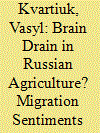

|
|
|
|
|
| Summary/Abstract |
Urbanisation and the ageing of the rural population contribute to shortages of skilled workers in agricultural sectors worldwide. Migration may potentially alleviate these shortages. This study explores individual decision-making by skilled Russian rural youth with respect to migration, paying special attention to values and attitudes. Using qualitative and quantitative data, we identify major factors that may influence intentions to move abroad. Apart from income differentials, we find that social ties, individual values and attitudes are associated with migration intentions. Agricultural students unwilling to work in agriculture and who dislike the rural lifestyle tend to be motivated to migrate abroad in search of an alternative.
|
|
|
|
|
|
|
|
|
|
|
|
|
|
|
|
| 4 |
ID:
119940
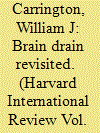

|
|
|
| 5 |
ID:
147441
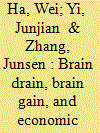

|
|
|
|
|
| Summary/Abstract |
We have used Chinese provincial data (1980–2005) to examine the effects of permanent and temporary emigration on human capital formation and economic growth in source regions. First, we find that permanent emigration is conducive to the improvement of both middle and high school enrollment. In contrast, while temporary emigration has a significantly positive effect on middle school enrollment it does not affect high school enrollment. Moreover, the different educational attainments of temporary emigrants have different effects on school enrollment. Specifically, the proportion of temporary emigrants with high school education positively affects middle school enrollment, while the proportion of temporary emigrants with middle school education negatively affects high school enrollment. Finally, we find that both permanent and temporary emigration has a detrimental effect on the economic growth of source regions.
|
|
|
|
|
|
|
|
|
|
|
|
|
|
|
|
| 6 |
ID:
124642


|
|
|
|
|
| Publication |
2013.
|
| Summary/Abstract |
For some developing countries, the international flow of their human talent in the recent decade was more of a "reverse brain gain" than a "brain drain." China, too, joined the group of states whose students, after studying abroad, now found sufficient opportunity and an acceptable quality of life back home to make returning after graduation a reasonable option. Still, China had not succeeded in bringing back the very best scientists and academics. To remedy this problem, the Organization Department of the Chinese Communist Party became actively involved in the recruitment process. The key programme was the "1000 Talents" Plan, introduced in 2008 by Politburo member Li Yuanchao, who had a visionary perspective on reverse migration. This programme has succeeded in bringing back entrepreneurs full time; but it has not attracted the very best of the Chinese scientists and academics who studied and lived overseas to return fulltime.
|
|
|
|
|
|
|
|
|
|
|
|
|
|
|
|
| 7 |
ID:
140256
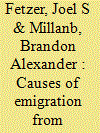

|
|
|
|
|
| Summary/Abstract |
Efforts to maintain a robust Singaporean economy have had to confront the serious challenge of substantial brain drain from the city-state. To address the negative effects of this problem, Singapore's ruling People's Action Party (PAP) has adopted a policy of increasing reliance on a foreign labor force. Meanwhile, the PAP appears to ignore the continued loss of human and intellectual capital. This study examines the main determinants of emigration from Singapore, specifically the political factors. The analysis is based on two primary data surveys that investigated what Singaporeans think about emigration: the 2006 Asian Barometer and the 2000–2002 Longitudinal Survey of Immigrants to Australia. Contrary to some previous empirical literature, data from these surveys indicate that anti–PAP and pro-democratic ideas strongly influence the decision of native Singaporeans to leave the island state. These findings likewise suggest that democratization and an expansion of business and technical education would be more effective in preserving economic growth than a policy of importing labor in the face of popular xenophobia.
|
|
|
|
|
|
|
|
|
|
|
|
|
|
|
|
| 8 |
ID:
085621
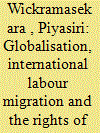

|
|
|
|
|
| Publication |
2008.
|
| Summary/Abstract |
The aim of the paper is to highlight the gaps between policy and practice in the current discourse on international migration and its links with development. It contends that a major cause of the limited development impact of migration is the 'closed door policy' of major destination countries on the admission of low-skilled migrant workers from developing countries. The paper addresses the weak foundations and major consequences of this policy: the denial of labour demand, channelling a large part of flows to irregular migration, consequent exploitation and violation of rights of migrant workers, and accelerated brain drain from developing countries. While there is increasing emphasis on temporary migration policies and programmes for low skilled labour, achievements on the ground have been quite limited. The movement towards a global migration regime which can address current pressing issues has also not progressed beyond broad consultative forums. There is an imperative need for fresh approaches and bold initiatives to promote international labour mobility for the welfare of the global community
|
|
|
|
|
|
|
|
|
|
|
|
|
|
|
|
| 9 |
ID:
139571


|
|
|
|
|
| Summary/Abstract |
This article focuses on two questions regarding the movement of persons across international borders: (1) do states have a right to unilaterally control their borders; and (2) if they do, are migration arrangements simply immune to moral considerations? Unlike open borders theorists, I answer the first question in the affirmative. However, I answer the second question in the negative. More specifically, I argue that states have a negative duty to exclude prospective immigrants whose departure could be expected to contribute to severe deprivation in their countries of origin. Countries have a right to unilaterally control their borders, but their exercise of this right is constrained by the demands of morality.
|
|
|
|
|
|
|
|
|
|
|
|
|
|
|
|
| 10 |
ID:
105057


|
|
|
| 11 |
ID:
067568
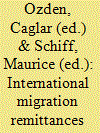

|
|
|
|
|
| Publication |
Hampshire, Palgrave Macmillan, 2006.
|
| Description |
xiv, 274p.
|
| Standard Number |
0821363727
|
|
|
|
|
|
|
|
|
|
|
|
Copies: C:1/I:0,R:0,Q:0
Circulation
| Accession# | Call# | Current Location | Status | Policy | Location |
| 050591 | 304.8/OZD 050591 | Main | On Shelf | General | |
|
|
|
|
| 12 |
ID:
125151
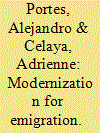

|
|
|
|
|
| Publication |
2013.
|
| Summary/Abstract |
This essay reviews existing theories of professional emigration as background to examine the present situation. Classical theories of the brain drain neglected the possibility that immigrant professionals would return to their home countries and make significant investments and economic contributions there. They do, in fact, with beneficial consequences for the development of these countries. The advent of the transnational perspective in the field of immigration has helped clarify these dynamics, while identifying the conditions under which professional cyclical returns and knowledge transfers can take place. Implications for the future attraction of foreign professionals by the United States and other advanced countries are discussed.
|
|
|
|
|
|
|
|
|
|
|
|
|
|
|
|
| 13 |
ID:
116849


|
|
|
|
|
| Publication |
2012.
|
| Summary/Abstract |
Over recent decades global labour markets have emerged and skill shortages in particular sectors have generated an international competition for the best and brightest. The developed world is seen to 'poach' this talent from poorer countries, with the resultant 'brain drain' undermining their capacity to develop. This paper calls into question the assumption that the emigration of the highly skilled will automatically represent a loss to the country of origin. The paper positions itself between the two extremes of brain drain as constituting a pure loss or a pure gain for sending countries and calls for a more moderate approach to skilled migration and its impact on development. The paper goes beyond the simple brain drain/brain gain dichotomy by looking at the flow of the skilled within specific geographic spaces and the resultant policy dilemmas and options.
|
|
|
|
|
|
|
|
|
|
|
|
|
|
|
|
| 14 |
ID:
088687
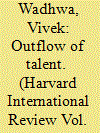

|
|
|
| 15 |
ID:
140170
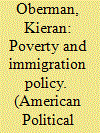

|
|
|
|
|
| Summary/Abstract |
What are the ethical implications of global poverty for immigration policy? This article finds substantial evidence that migration is effective at reducing poverty. There is every indication that the adoption of a fairly open immigration policy by rich countries, coupled with selective use of immigration restrictions in cases of deleterious brain drain, could be of significant assistance to people living in poor countries. Empirically there is nothing wrong with using immigration policy to address poverty. The reason we have to reject such an approach is not empirical but normative. People have human rights to stay in their home country and to migrate elsewhere. Counter poverty measures that require people to move or to stay are likely to violate these rights. Everyone should be free to migrate but no one should be forced to migrate. Using immigration policy to address global poverty, in place of alternatives, fails on both these counts.
|
|
|
|
|
|
|
|
|
|
|
|
|
|
|
|
| 16 |
ID:
138416
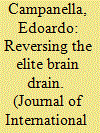

|
|
|
|
|
| Summary/Abstract |
Since the end of the World War II, Europe has been repeatedly afflicted by waves of brain drain, with varying degrees of intensity across time and countries. But these outflows of human capital have rarely turned into some form of brain circulation, nor have they been compensated by adequate inflows of foreign talents. Now, the Digital Revolution and the economic restructuring imposed by a never-ending Eurozone crisis are amplifying the costs of these human capital losses, creating skills shortages that are undermining Europe’s ability to compete globally. So far, the European Commission (EC) has taken steps to loosen immigration policies to attract skilled foreigners from across the world. A thorough historical analysis, however, will show that it is high time for European governments to reattract their runaways. Policies aiming at remigration, rather than immigration, will generate greater political and economic efficiency.
|
|
|
|
|
|
|
|
|
|
|
|
|
|
|
|
| 17 |
ID:
178433


|
|
|
|
|
| Summary/Abstract |
This study empirically investigates the effect of terrorism and other push and pull factors on the skilled labour out-migration in Pakistan over the time period 1973–2015. The empirical findings based on fully modified ordinary least squares (FM-OLS) technique suggest that the waves of terrorism have not significantly driven the out-migration of skilled labour from Pakistan. Relatively, traditional push factors including inflation, unemployment and rising capital share in gross domestic product (GDP) have remained the major factors behind brain drain from Pakistan. Comparatively, the per capita economic growth, poverty and host and origin country’s emigration policies have curtailed the skilled out-migration. The findings suggest improving socio-economic conditions, increasing GDP per capita and decreasing unemployment and inflation in order to control the out-migration of skilled workers from Pakistan. Besides, the domestic labour market is required to boost the absorption capacity of highly educated and qualified workers in the country by making them more compatible to the existing stock of capital to restrict the brain drain.
|
|
|
|
|
|
|
|
|
|
|
|
|
|
|
|
|
|
|
|
|